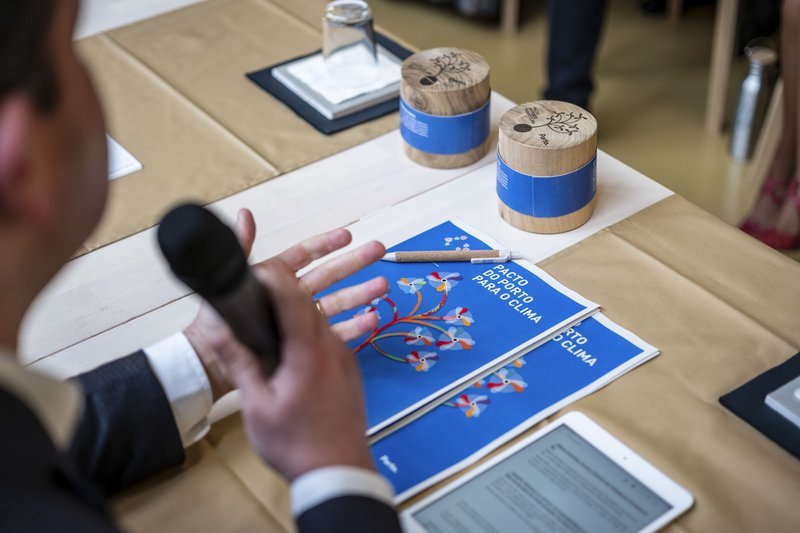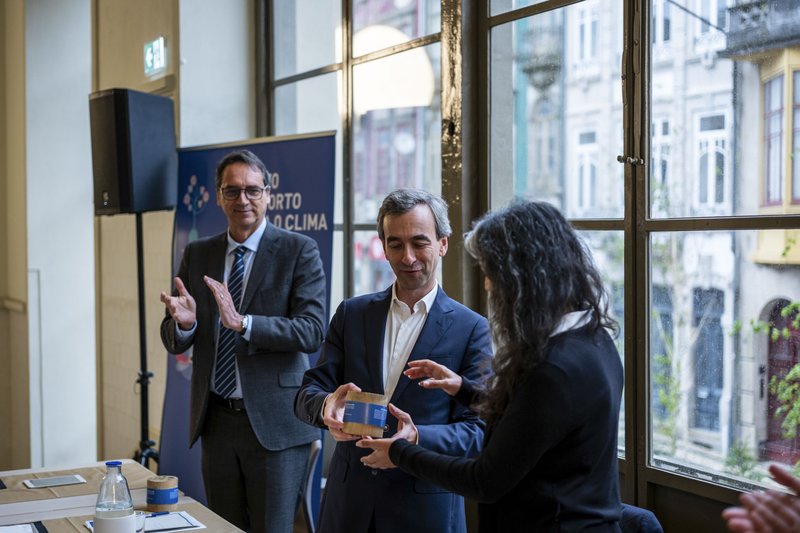Porto Climate Pact gets more and more signatories
Article
The Faculty of Nutrition and Food Sciences of the University of Porto (FCNAUP) and Too Good To Go are already part of the active community of Porto Climate Pact partners. Membership was formalised on Tuesday morning at Mercado do Bolhão, in the presence of Deputy Mayor Filipe Araújo.
There are already 235 institutional signatories to the Porto Climate Pact. This joint commitment to achieve carbon neutrality in Porto by 2030 has more and more subscribers, including public and private organisations and citizens. Two more have joined this Tuesday, following a conversation with the Deputy Mayor of Porto, the director of the Faculty of Nutrition of the University of Porto, Pedro Graça, the country manager in Portugal of Too Good To Go, Maria Tolentino, and António Marques, Sustainability Director at Ibersol.
The debate approached the large global food waste figures in the world, especially those published recently in the International Day of Zero Waste. The United Nations Environment Programme launched the Food Waste Index Report , which identifies some shockingly relevant figures in scale:
- in 2022, the world wasted more than a billion meals a day;
- that same year, 783 million people were affected by hunger;
- 1/3 of humanity has faced food insecurity.

Focussing on local action as a contribution to the global whole, Filipe Araújo presented several of the city's initiatives focusing on combating waste. Porto stands out for being, primarily, a territory of consumption, where the sustainability of the food system manifests itself through circularity, focussing especially on the stages of consumption and the end-of-life of food.
This practical and tangible approach aims to minimise food waste and manage bio-waste efficiently. Aware of the significant impact that Porto, as a consumption centre, has on the region, the importance of strengthening the urban-rural connection has been highlighted, encouraging sustainable production and consumption practices.
This endeavour includes promoting greater proximity between citizens and local regenerative producers, strengthening economic, social and environmental ties, and supporting the adoption of regenerative, fair and local practices, something that the Municipality has promoted from the outset with Mercado do Bolhão, but also with the Good Food Hubs initiative.
Against food waste
The director of FCNAUP highlighted the Academy's humility in seeking solutions to the problem under discussion, encouraging the various players to collaborate in order to find different answers, ranging from the participation of the scientific community in their day-to-day work, but also by promoting literacy and training among younger audiences and consumers themselves.
Too Good To Go, as a social impact company that connects users with partner shops to save unsold food and prevent it from going to waste, can play an important role in the fight against waste. Maria Tolentino highlighted the impact of food waste, which accounts for around 10% of global greenhouse gas emissions and is a priority issue for Portugal.

In her speech, she called on the government to adopt measures against food waste, committing to the implementation of significant actions over the next four years, in line with the policies being developed at European Union level.
For António Marques, Sustainability Director at Ibersol and one of the Too Good To Go implementation partners, this is a very relevant issue and the group's sustainability policy is geared towards reducing all possible waste. The optimisation of the various sectors of the logistics chain is already a reality in the group, and dealing with the surplus of food already prepared will be an addition to the sustainability ambition.
The debate ended with the two partners signing the Porto Climate Pact. We should recall that the city of Porto was selected by the European Commission to join the group of 100 Smart Cities with a Climate Neutral Impact, and as a Mission City, Porto's ambition is to be a national and European leader in climate action, bringing forward carbon neutrality by 2030.